- Home
- Patricia Hickman
Tiny Dancer Page 8
Tiny Dancer Read online
Page 8
“You don’t know everything. This world’s in a turmoil. But you’re a kid, so just enjoy your childhood.”
“I saw his black eye. They hurt Reverend Theo real bad.”
“This past year’s been hard on us all,” he said. “Can’t blame you for being confused.”
I hated seeing disappointment in Daddy’s eyes. Here we had talked for five minutes and I knew less about him than before we had started. “Daddy, the way we are now, our sadness changing every part of us? Will it pass?”
“I’m sure it will. It’s not like we’ve ever gone through something like this before. You understand don’t you?” he asked.
I nodded. Then I washed and dried his dishes and told him good-night. He headed up the stairs while I promised I’d be up later. “I might watch a late movie,” I called up after him. Really it was only an excuse to stay downstairs until Vesta and Daddy had stopped their running back and forth to the bathroom. I did not want to look into either one of their eyes and so I protected my need to be alone. Without anyone telling me until now, old rules got erected in the past week, seemed like old ones anyway. Vesta and Daddy might as well have taken sawhorses and made a big wall around me.
I found a Dracula movie and settled into it, escaping the tension hanging over the house. Then I fetched some of the forbidden pork and devoured it like a vampire. I sat stuffing myself on Jackie the Pig like there was no tomorrow. But in spite of what my family chose to ignore, tomorrow was coming, like it or not.
Chapter Four
The next week flew past in a searing haste. A cloud had settled over my attitude toward Daddy. I attended the next Saturday pig-picking, skating past Vesta’s watchfulness by telling Daddy I had cleaned my room and would stay outdoors for a bit to escape the chlorine fumes. I scarcely left a breath between my last word and sliding out the patio door. As casually as I could muster, I lounged out on the back porch reading a movie magazine. Then I busied myself watering Vesta’s geraniums. When I wound up the water hose, I carried it slyly into the front of the old shed and slid out the back door, round the barricade, and into the garden, pretty as you please.
I came in by bedtime bearing another offering of spice cake for Daddy, though I left it for him in the refrigerator, slid right behind his beer, and disappeared upstairs into my room. The last piece he had turned away disappeared from out of the back of the refrigerator. He had a sweet tooth that could not resist temptations, especially home baked cakes. I was still feeling light and airy as I had joined the levity by dancing with the other youths. I had explained an Irish jig to the fiddlers. They picked up on it pretty well. Then the little girls joined me in the dance followed by the women. I noticed that two of the nephews were not around, Calvin and Whit. When I asked about them, not a soul would answer or tell me if they were coming or not. Ratonda had gotten up and gone into the house when one of the women had yelled for her to join in the dance. But Ratonda might have been far too strict on herself, not one to kick up her legs in front of the men. I placated myself with that thought anyhow, even when I caught Ratonda staring a mean hole through me.
I kept the memory close of dancing under the moon with people whose ancestors would flip in graves over knowing they were dancing an Irish jig.
Remembering the guilt from the prior weekend, I hoped no one at home would land on me with sharp opinions and sand away the good that came of it. My mind was covered in the evening’s glitter, as if it had sifted down between the clouds especially for my sake. I was greedy for the feelings of good will to remain and not pass. I floated into sleep as if my body was being lifted up to the stars.
Come Monday, I left the house early as I had done every morning the past two weeks. But instead of hiding out in the sunflower forest to await an invitation from Dorothea, I headed straight for the Millers’ back porch for, in spite of Theo’s complaints, they would be expecting me.
“I made so many eggs this morning,” said Dorothea, “that I wondered to myself, now who will eat all of these eggs?” She had set out fried eggs, bacon, and biscuits on the back porch table.
I joined her unsure of whether or not Reverend Theo had gotten up yet. Soon enough he came out buttoning his top button. He had gone down into their cellar, he said, to fetch peach preserves. He wiped the jar and set it out with a spoon. His bandage had been removed, the scar beside his eye shiny and healing up, though the stitches were still visible. His black eye had blued, fading under his bottom lashes.
“You run into a wall?” I asked.
“A big one,” he said. “But I walked around it.” He did not look at me.
Tuesday I went back. It was pancakes and strawberry jam syrup. Tiny blueberry muffins made from scratch and baked in silver holders sat on a Lazy Susan Dorothea said she had saved from her mother’s kitchen. I knew by now that Dorothea had grown up in Louisiana. She talked of high tea and customs fascinating to me. I imagined women in wide hats, stirring cubed not granular sugar into their teacups, nibbling biscuits no bigger than marshmallows.
“You both know so many small details about your ancestors,” I said, rapt with Dorothea’s stories. The only thing I knew about my own was that my great-great-grandfather on Mama’s side was a German immigrant who farmed a plantation. It came to me that my ancestor might have kept the Miller’s ancestors like real estate. Then I imagined those whites drinking their tea while women like Dorothea waited in the kitchen for the bell to ring, much like the domestics all up and down Cotton Street. I decided for once not to blurt out what popped into my head.
Dorothea gave her husband a look that he seemed to interpret right off. He said, “My wife thinks that we might have put you on the spot asking you to share a sad story in my Story Chair. So this is my apology to you, young Miss Curry, on behalf of our entire family.”
“Oh no, I wasn’t offended. But I never can share my sad story out loud like other people. I mean, imagine me talking to my friends, like my best friend Claudia or our classmates, and they’re talking about bad haircuts or breaking up with boyfriends. All I’ve got in my back pocket is our accident. It’s a party ruiner, if you know what I mean.”
“Not to us,” said Dorothea. “Sorrow knows us.”
“We don’t disconnect from our sorrow, is what Dorothea means,” said Reverend Theo.
“My family has no idea what that means, I can assure you.” I was tempted by the thought of spilling my pain out all over breakfast. I could not imagine doing such a thing. “My mother, Alice, she talked a lot after she had been drinking. Daddy was none too pleased about that, best I can remember. I guess our family’s always believed confessing too much is a flaw.”
“I can see the wisdom of that,” said Dorothea. She asked Theo to pass her the bread. Then she changed the conversation and soon was laughing and telling about the time she had climbed a tree to look down on her sister kissing a boy she secretly liked herself.
I sat cross-legged nodding and absorbing Dorothea’s story, feeling as if I walked alongside her into a place of mystery and wonder. An image darted across my mind, of Billy kissing me on the beach, the two of us like two flies stuck together. But I did not possess the power to come out of the shadows like Dorothea. When Dorothea paused, I sat looking expectantly, as if cuing her to keep talking. It was a skill I had learned from Daddy.
* * * * *
The entire kitchen smelled sickeningly sweet, for a neighbor had dropped off three crates of strawberries. Daddy wanted to freeze them, saying how nice it would be to pour warm sugared berries over ice cream in the middle of December. Vesta wanted jam. “We could never eat all these,” she said, expressing her worry they’d not keep.
When I walked in on them, Daddy’s cuticles were red as a surgeon’s. He had been cutting tops off the berries, passing them to Vesta who prepared them on the stovetop for preserves. One of Vesta’s aprons hung over his t-shirt although he had not deigned to tie it on fully. Daddy was laughing at the generosity of spending his Sunday morning in such a manner. It was not ma
nly like cutting the grass.
“Here’s the extra set of hands we’re desperately needing. Daughter, grab a knife.” Daddy moved down a few inches to make room where he was stationed in front of the kitchen island. I laughed squeezing in next to him. I accepted the task, enjoying his high spirits. A faint smile lightened Vesta’s countenance while she studied the jam recipe.
S he was young looking for her age of forty-four, especially with her long, somewhat course hair clipped up the back in hairpins.
“I’ve not seen so many berries,” I said, wondering if we might be up half the night slicing and canning.
Daddy dumped more berries into the bowl I had just emptied.
Vesta was quiet, saying little while Daddy bantered with me. He loved teasing me, never having been around girls much growing up. He had a younger brother but they had grown up and apart. He glanced at Vesta and then at me. Then he removed the apron. He rinsed what he could from his hands although it was evident the red stain might challenge the first few washings. Then he gave a nod to me as if he were leaving me to engage in some kind of woman’s ritual with Vesta. But the silence between us after he slipped from the company of females only left me to fidget. I kept to my work, not a thought to what I should say next.
That had been the way of things between us since forever, even before our accident. I knew the space between us ought to fill up with the kind of talking and laughing I had observed between Dorothea and Ratonda. I yearned for it but when the moment was right to feel close to Vesta, I felt like a girl fallen from grace.
Then, as if ready to include me in her plans, she said, “The ladies bridge club is going to hold their next meeting here. Maybe you could invite Claudia. The two of you could serve, you know, act as hostesses.”
I did know what she meant, to serve her rich friends like domestics. She had asked once before and Claudia had nearly abandoned knowing me. I had to manipulate her and promise her we would dress like socialites, not domestics. “I don’t think she’ll want to do it,” I said.
“I’ll talk to Irene,” said Vesta. “She’s good to help out with Claudia.” She ignored my one protest as if I had never spoken it.
I knew Vesta had worked long at arranging a club meeting at our house, a house somewhat smaller than the homes picked for the club’s usual gatherings. She wanted to make up for size with window dressing. “I’ll ask her, all right?” I finally said.
Finally Vesta came beside me, examining the mound of berries Daddy and I had prepared. “We’ll have jam for all winter and the relatives too,” said Vesta, smiling at the sight of so many berries but admitting she might have overdone it on the amount.
“We could label the jams,” I said. “Strawberry Preserves—From the Kitchen of Vesta Curry. Give them out as Christmas gifts.”
Vesta liked my idea. I promised to start collecting tiny baskets from the thrift store.
“Red and green ones, if I can find them in Christmas colors,” I suggested convivially.
Vesta helped me finish and then asked if I might help her jar the hot strawberry potion. I put on two oven mitts to protect my fingers from the searing hot preserves. Helping Dorothea these past two weeks had given me confidence as a kitchen helper. I screwed down the lids once Vesta filled each jar, leaving headroom at the top, as she instructed, for expansion during the pressure-cooking phase.
We processed the last batch, lifting the frame from the hot pressure cooker. I wiped down the jars and lined them in a box Daddy had cut in half. Leaving them to set allowed time for the sealing process to complete. Vesta pointed out, “When a jar pings it’s sealed.”
I turned away after pushing the box of jams onto the island. I did not push it far enough, though, leaving the box of heavy hot jams imbalanced.
“Flannery, no!” yelled Vesta.
She startled me. I jerked away. Maybe a mouse had leaped from the cupboard. I did not know. The box slid onto the hard ceramic tiles, the jars slamming against the floor, exploding like little red grenades.
Vesta stared in disbelief. She was angry, red-faced, clinching her fists and staring at the broken glass and the still-steaming preserves splattered all over her freshly mopped floor.
Daddy ran into the kitchen calling out, “What’s wrong?” When he saw Vesta kneeling, her mouth agape, he asked, “Flannery, what’d you do?”
I could not breathe nor could I hold back the hot tears spilling down my cheeks. I wanted to take back the last minute, to close my eyes and make the jars fly magically back into the box, safe and not wrecked.
I was a terrible magician though. Nothing that broke open could go back the way it was. That was the way of everything, didn’t I know, especially the Curry family.
* * * * *
Reverend Theo sat with his foot propped most of the evening. His right foot was swollen after standing on it Sunday night and guest-preaching in Rock Hill but he wasn’t going to let it slow him down. Dorothea had invited church folk over for a Wednesday night crawfish boil. He joined the musicians in the circle with his guitar. Dorothea made a big pot of crawfish in a giant cook’s pot over an outdoor flame. She and the women spread newspapers on the tables and then poured crawfish, halfed corn cobbettes, and boiled hot potatoes on top of the newspapers, much like our clam bake on the beach.
Charlotte demonstrated to me how to suck on the crawfish head to draw out the savory juice. It took me a few moments of observance before I mustered the courage to try it out myself. Crawfish looked for all the world like giant bugs. But finally I gave in and tried one. The juice was good as promised. I peeled crawfish, eating each as fast as I could peel it. The corn and potatoes were cooked in a boil along with the crawfish, seasoning the vegetables hot and spicy. Even the youngest Miller granddaughter Diana devoured her weight in spicy food.
“Should she eat that hot food?” I asked.
Ratonda said, “Anton’s grandmother on his mother’s side would feed all her babies a hot pepper in their high chairs to groom the child’s palate.” She kept her eyes on the task of rolling up the littered sheets of newspaper. She still refrained more often than not on keeping her distance, making little eye contact with me.
When Dorothea walked out of the house proudly carrying her doberge cake, the women set to ooh-ing and ahh-ing.
Rosetta said to me, “Dorothea can make doberge as good as a New Orleans’ chef.” She explained how the cake was pieced together, sealing the multiple narrow layers with cooked chocolate custard.
The taste was rich like wedding petit fours, except the tall six-layer butter cake was so much bigger, thus the need for cutting the pieces into slender helpings.
Reverend Theo stood out in the back yard explaining a new raised garden he was putting in. He was having a truckload of manure and good black soil delivered for the project. Two of the children walked Reverend Theo up the stairs onto the porch. He took his place in the wide cushioned wicker rocker no one dared claim for it was an unspoken fact that it was strictly the minister’s chair.
He reached across the white bamboo table and jerked the chain on the lamp. Better for seeing those seated around him. The visiting grew quiet except for Charlotte who squealed, “Story Chair!”
I could not describe the next minute any differently for it was as if ghostly hands lifted me off the back porch step and drew me into the big blue chair. My hands rested on the arms, wood so aged I wondered at how it carried the faint smell of the swamp from so far away. A chanting sound startled me, but it was only the aunts singing low, their bodies swaying in a kind of trance. I looked at Dorothea who shook her head and whispered, “You don’t have to do this, Flannery.” Matter of fact, she said, “Please don’t.”
I didn’t know what I might say first, but then I did not have to say anything. A cry so deep rose up it seemed to well from out of the earth, up through the soles of my feet, and out of my throat. I let out a cry I could not contain even when I saw Vesta’s bedroom light come on through the strands of the hanging cherry tree branches
and the lilting crepe myrtle. I wept and the women gathered around me placing their hands on my shoulders and even the top of my head. They wailed with me until Reverend Theo nodded at the musicians who set to playing a mournful song. The women joined in a song about a heart that needed to be set free.
“I did it,” I said. “I killed my sister.”
I cried until Dorothea came up out of her seat and threw her arms around me. “I happen to know better,” she said. It was when Dorothea’s soft brown ear was right at my mouth I whispered, “It’s my fault my sister died. I moved to the back seat.”
“That wasn’t at your hand,” said Dorothea closing her eyes like a seer, as if she could close her eyes and summon the scene of the accident, not knowing any more about it than what the papers said. “It wasn’t your time,” she said. “Don’t you believe you have the power of life and death. It isn’t yours to give and take.”
And just like Moses drawing back the Egyptian waters, the tears dried up. I sat back nearly gasping when the burden lifted, like a cloud of steam escaping into the ether. The women must have known for they started up a new chorus. “I got rid of my heavy load, heavy load. I got rid of my heavy load.”
* * * * *
The argument between Daddy and Vesta late Sunday night started some time after I had settled under my cotton sheets, long after the Miller’s guests had stored away all of the folding chairs and kissed Dorothea good night.
I opened full wide my curtains to fall asleep with the light from the moon guarding the mystery I had just gotten from the circle of women and Theo’s Story Chair. I reached out my hand imagining I was touching the moon, willing Siobhan to reach out and touch it from her side the same as the women had reached out and touched me tonight. I could feel them all with me there, lying in my bed surrounded by a dozen mothers. I felt Siobhan so close that I imagined Siobhan heard me whisper, “I love you,” and believed she heard it. “I’m sorry I didn’t say that often enough to you while you were here,” I said.

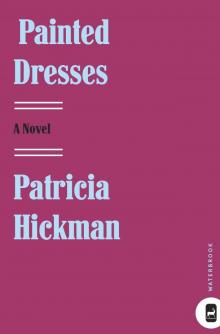 Painted Dresses
Painted Dresses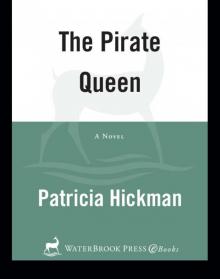 The Pirate Queen
The Pirate Queen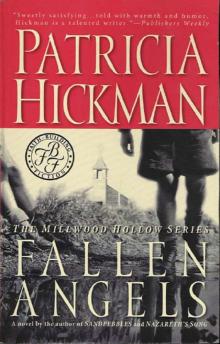 Fallen Angels
Fallen Angels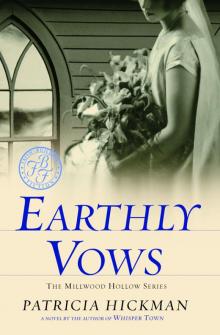 Earthly Vows
Earthly Vows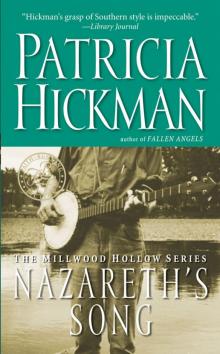 Nazareth's Song
Nazareth's Song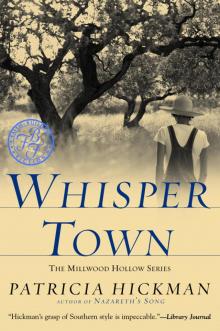 Whisper Town
Whisper Town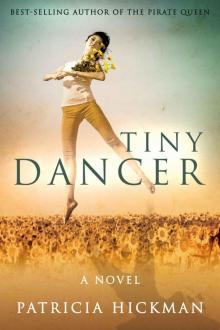 Tiny Dancer
Tiny Dancer